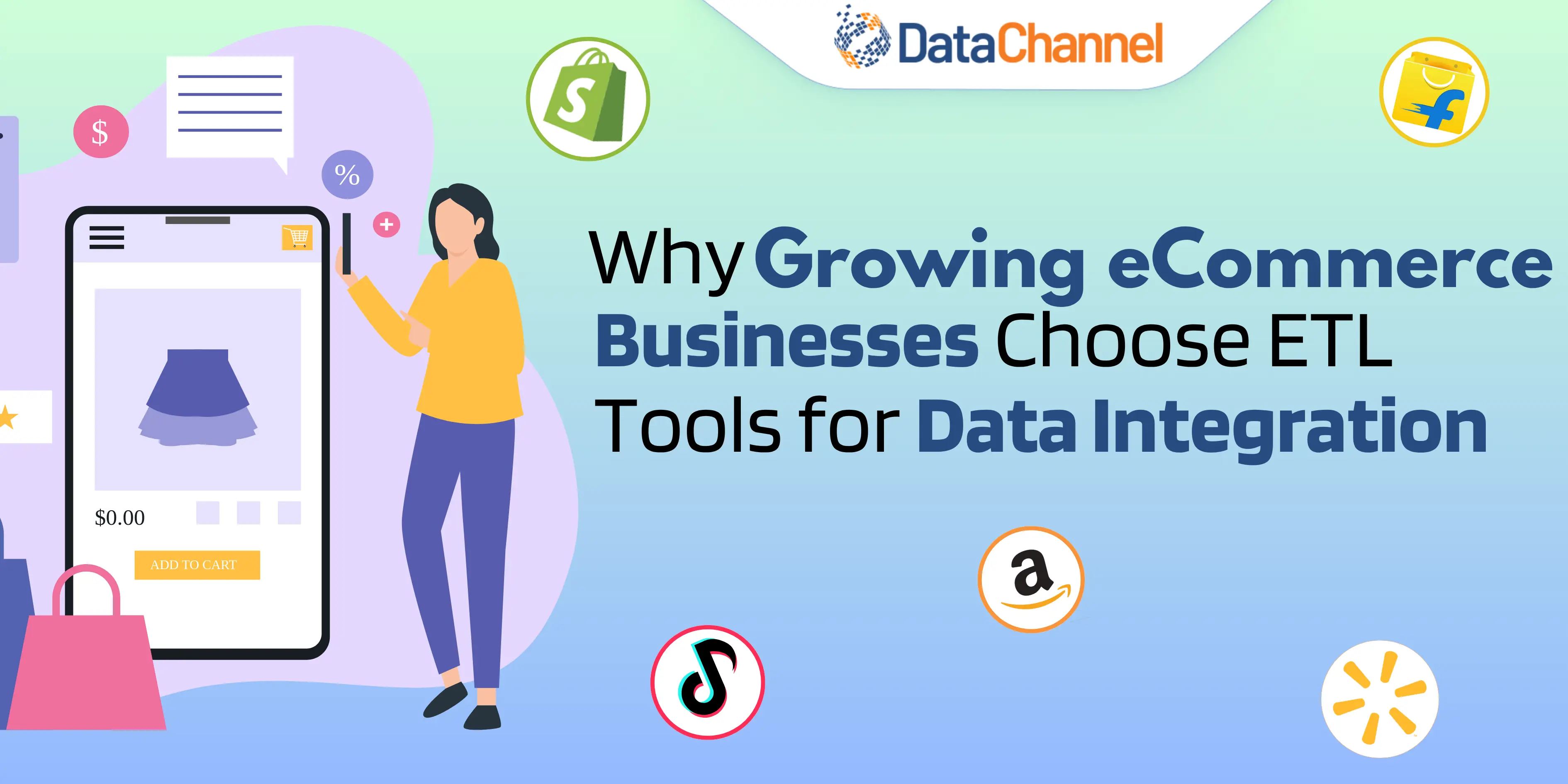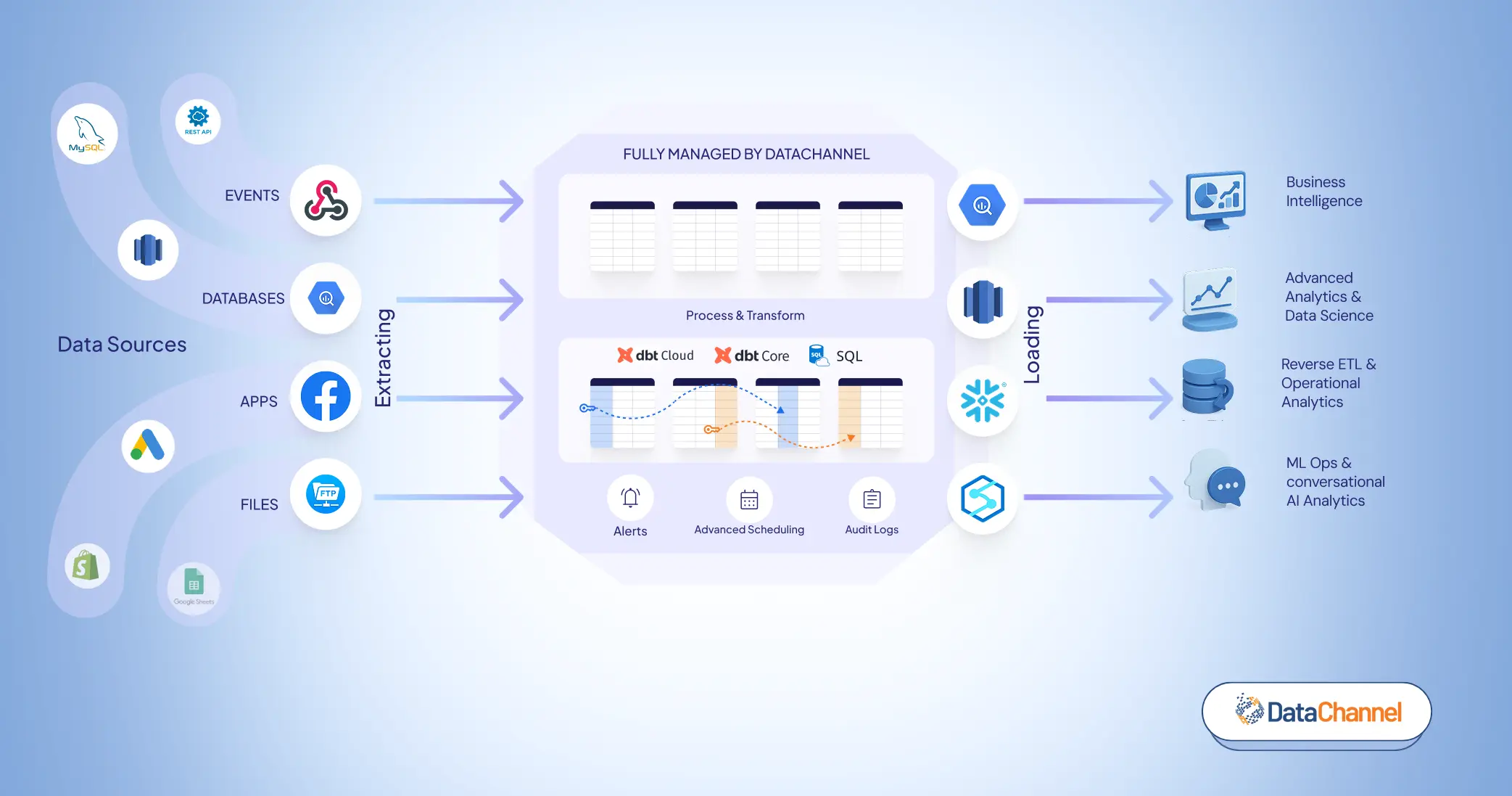
Why eCommerce Businesses Choose ETL Tools for Data Integration

Most growing eCommerce businesses begin their data journey using spreadsheets, ad-hoc SQL scripts, and last-minute developer help to pull marketing data. Pretty soon, teams are buried in endless tabs, piecing together insights from disconnected platforms like Shopify, Amazon, and Meta Ads - all while trying to meet deadlines.
This is where things start to break.
Manual data integration (tools) simply can’t keep up with the pace of modern marketing. And for eCommerce teams trying to make real-time, revenue-driving decisions, that lag isn’t just inconvenient - it’s costly.
This is exactly why growing brands need a scalable ELT tool ( like DataChannel) to handle the complexity of data integration across platforms and fill the gaps left by manual efforts.
In this blog, we’ll break down why modern eCommerce teams outgrow manual data integration and how ELT tools help them keep pace with changing customer and business needs.
Why Manual Data Integration Fails Growing eCommerce Businesses
Let’s start with first understanding why manual data integration simply can’t keep up, especially for fast-moving marketing and eCommerce teams.
When Spreadsheets and Scripts Start Slowing You Down
In the beginning, manual data handling seems manageable. Spreadsheets, code, and one-off data pulls do the job: it’s basic, but it works.
But as your eCommerce business starts to scale, that setup quickly falls apart. With more campaigns and additional platforms in play, data teams are forced to jump between tools just to extract information. Reports are scattered across Excel sheets and CSV exports, and what started out as an easy & manageable process turns into a time-consuming & error-prone one.
Manual data integration Was Never Built for Speed or Scale
Manual data integration is of course a time consuming process but it was not built for speed or scale either.
Scaling across platforms demands faster access to insights and manual setups only slow marketers down, making room for more errors while increasing their dependency on data teams. Thus, leading to siloed data, missed opportunities and lost customers.
What Growing eCommerce need ETL tools for data integration
As the cracks in manual ETL workflows become more imminent, growing eCommerce teams start looking for tools that offer both short-term reliability & long-term growth. The ideal tool that not only moves data but also empowers marketing teams with up-to-date insights to act faster with minimal technical know how.
Why ELT tools make sense and why ecommerce businesses should choose them for Data Integration
To help you understand how ELT (Extract, Load & Transform) works, here’s a quick overview of its three core steps:
- Extract: This step includes extracting data from various sources, but instead of transferring it to a staging area, the raw data is put directly into the target system.
- Load: The extracted data is placed into a data warehouse, data lake, or other comparable storage environment during ELT.
- Transform: The transformation occurs within the target system itself, utilizing the storage platform's processing power. SQL or other languages can be used directly on the raw data to execute transformations.
ELT Tools-
Offer Simplicity Without Code
Traditional ETL tools fall short for fast-moving eCommerce businesses. They’re built for engineers, not marketers. Every now data source, every update, every bug fix? It all requires code and someone technical.
Unlike traditional ones, modern no-code ETL tools let marketers, analysts, and eCommerce teams connect data sources, automate data ingestion, and build data pipelines: all without writing a single line of code.
It’s not just about ease-of-use. It’s about giving marketers the power to move quickly, uncover insights, and launch smarter campaigns without waiting on the development team.
Offer Scalability That Matches Your Growth
Modern data integration tools such as DataChannel are designed to scale with you. Whether you’re syncing thousands of SKUs from Shopify or analyzing ROAS across Meta Ads, a truly scalable eCommerce ELT solution grows with your business, without increasing engineering overhead.
Real Use Cases of ETL Tools in Ecommerce Analytics
Your team is launching a new campaign across Meta Ads and Google Ads. You need to know which audience segment is converting best, which product category is trending, and where your ROAS is dropping.
However, the data resides in five different tools, each in a distinct format. This is exactly where ETL tools for ecommerce analytics come into play to build a centralized data repository to power agile decision making.
- Campaign Performance Attribution
Connect ad spend data from Meta Ads, Google Ads, and TikTok directly with revenue data from Shopify or Amazon: to measure campaign performance holistically
- Customer Journey Mapping
Blend clickstream data from GA4 with behavioral data from your eCommerce website: to refine product pages, re-engagement & retargeting strategies based on customer engagement.
- Measure ROI
Feed all your channel metrics into one dashboard - clean, normalized, and always up-to-date: to build a real-time, automated view that empowers the marketing team to make decisions daily, not monthly.
- Automating Routine Reporting
With scalable data pipelines, you can auto-sync campaign performance, inventory levels, and revenue data into BI tools ( Tableau, Power BI, or Google Data Studio): with no manual intervention needed.
These are some of the most powerful use cases in ecommerce analytics that become a reality when businesses eliminate broken workflows and adopt a no-code ETL platform built for both marketers and tech teams alike.
.webp)
How DataChannel Solves What Manual ETL Can’t
DataChannel is a no-code ETL platform purpose-built for the speed, scale, and complexity of modern eCommerce businesses. Whether you’re a marketer, analyst, or part of a fast-scaling operations team, DataChannel is the right tool for you.
Whether you’re syncing Shopify orders, Amazon sales, Meta Ads performance, or Google Analytics events, you can schedule automated workflows in just a few clicks. Even advanced tasks like filtering, transforming, or mapping fields are completely configurable through its intuitive interface.
This is what makes DataChannel different from other ETL tools. Instead of forcing your team to build and maintain custom scripts, you’re working with a tool ad hoc for eCommerce that puts control in the hands of marketers - the people who need insights most.
Pre-Built Integrations That Save You Hours
DataChannel offers 150+ pre-built integrations; you can connect the platforms your business relies on, from Shopify, Amazon, Walmart, and WooCommerce to Meta Ads, TikTok Ads, GA4, and more (in minutes).
Just select your source, define the sync schedule, run your data pipelines, and you have ready-to-use data in your data warehouse or marketing analytics tools without using a single line of code.
You’ll be able to unlock faster decision-making, reduce friction, and give your team the freedom to test, launch, and iterate, without waiting for the development team to catch up.
Built for eCommerce Growth & Analytics
With data scattered across ad platforms, marketplaces, and web analytics tools, access to granular insights is almost impossible with manual processes.
Once again DataChannel helps you big time with automated, clean, and reliable insights to boost your eCommerce growth. Whether it’s analyzing cross-channel ROAS, optimizing SKU performance on Amazon, or comparing acquisition cost across Meta and Google Ads, DataChannel turns raw data into insights & clarity.
And because it’s a no-code ETL platform, your marketers and analysts can own their reporting, without having to depend on a developer every time they hit a roadblock.
Ready to Grow Without the Chaos?
For eCommerce businesses, whenever a new platform adds more manual work or when your marketing team is stuck waiting for reports, it’s time to rethink your choice.
Manual ETL wasn’t built for scale. It wasn’t built for marketing agility, or for the speed today’s eCommerce businesses demand.
But with DataChannel you can actually grow your business without the chaos. Its powerful, no-code ETL functionality is designed specifically for eCommerce and marketing analytics teams to help you automate your data workflows, integrate every source in your stack, and scale with confidence.
Try DataChannel Free for 14 days









